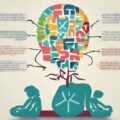Embracing Your Unique Strengths: A Path to Personal Growth
We all possess unique strengths and abilities that make us who we are. By focusing on and nurturing these strengths, we can unlock our full potential and lead more fulfilling lives. Strength-based skills and activities offer a compassionate approach to personal development, emphasizing what we’re naturally good at rather than fixating on perceived weaknesses. This positive perspective not only boosts our confidence but also enhances our overall wellbeing.
Understanding Strength-Based Approaches
A strength-based approach focuses on identifying and leveraging an individual’s inherent talents, skills, and positive qualities. Rather than trying to “fix” perceived shortcomings, this method encourages us to cultivate and build upon our existing strengths. By doing so, we can achieve greater success and satisfaction in both our personal and professional lives.
Some key principles of strength-based approaches include:
- Recognizing that everyone has unique strengths and abilities
- Focusing on what’s working well rather than what’s not
- Believing in the potential for growth and improvement
- Emphasizing collaboration and support
- Promoting resilience and self-efficacy
Identifying Your Core Strengths
The first step in embracing a strength-based approach is to identify your core strengths. This process of self-discovery can be both enlightening and empowering. Here are some ways to uncover your unique talents:
- Self-reflection: Take time to think about activities that energize you and tasks you excel at naturally.
- Feedback from others: Ask trusted friends, family members, or colleagues what they perceive as your strengths.
- Strength assessments: Take online tests like the VIA Character Strengths Survey or CliftonStrengths Assessment.
- Journal: Keep a record of your accomplishments and moments when you felt most engaged and successful.
- Explore new activities: Try different hobbies or tasks to discover hidden talents.
Cultivating Strength-Based Skills
Once you’ve identified your core strengths, the next step is to cultivate and develop them further. This process involves intentionally engaging in activities that allow you to use and refine your natural talents. Here are some ways to nurture your strengths:
- Seek out opportunities that align with your strengths in your personal and professional life
- Set goals that leverage your unique abilities
- Practice using your strengths in new and challenging situations
- Learn from others who excel in areas related to your strengths
- Reflect on how you can apply your strengths to overcome obstacles
Remember, the goal is not to become perfect at everything, but to become exceptional in areas where you already have a natural inclination.
Strength-Based Activities for Personal Growth
Engaging in strength-based activities can help you further develop your talents and boost your overall wellbeing. Here are some ideas to get you started:
- Strength journaling: Regularly write about how you’ve used your strengths and the positive outcomes that resulted.
- Strength spotting: Practice identifying strengths in others and offer genuine compliments.
- Strength challenges: Set weekly challenges that push you to use your strengths in new ways.
- Strength partnerships: Team up with someone whose strengths complement yours for mutual growth and support.
- Strength-based problem-solving: When faced with challenges, brainstorm solutions that utilize your unique strengths.
By consistently engaging in these activities, you’ll not only enhance your strengths but also develop a more positive and resilient mindset.
Applying Strength-Based Skills in Daily Life
Integrating your strengths into everyday life can lead to greater satisfaction and success. Here are some ways to apply your strength-based skills:
- At work: Volunteer for projects that align with your strengths and discuss with your supervisor how to better utilize your talents.
- In relationships: Use your strengths to support and uplift your loved ones, and communicate how they can best support you.
- Personal development: Choose learning opportunities and goals that build upon your existing strengths.
- Community involvement: Seek volunteer opportunities or leadership roles that allow you to contribute your unique abilities.
- Self-care: Engage in activities that energize you and align with your natural talents as part of your wellness routine.
By consciously applying your strengths across various aspects of your life, you’ll likely find increased engagement, fulfillment, and a greater sense of authenticity.
Frequently Asked Questions
1. What if I’m not sure what my strengths are?
If you’re unsure about your strengths, start by reflecting on activities you enjoy and excel at naturally. Consider taking a strength assessment or asking trusted friends and colleagues for their observations. Remember, strengths can be skills, character traits, or natural tendencies.
2. Can strengths change over time?
While core strengths tend to remain relatively stable, how we express and develop them can evolve over time. New experiences and personal growth can also reveal strengths you may not have been aware of previously.
3. How can I use my strengths to overcome challenges?
When facing difficulties, consider how your unique strengths can be applied to the situation. For example, if you have strong analytical skills, you might approach a problem by breaking it down into smaller, manageable parts. The key is to think creatively about how your talents can be leveraged in various contexts.
4. Is it okay to focus on strengths and ignore weaknesses?
While the strength-based approach emphasizes developing your natural talents, it doesn’t mean completely ignoring areas for improvement. The idea is to focus more energy on maximizing your strengths while managing weaknesses to an acceptable level, rather than trying to excel in every area.
5. How can organizations benefit from a strength-based approach?
Organizations that adopt a strength-based approach often see increased employee engagement, productivity, and job satisfaction. By aligning tasks with individual strengths and fostering a culture that values diverse talents, companies can create more positive and effective work environments.
Embracing a strength-based approach to personal development is a journey of self-discovery and growth. By focusing on what you do best and nurturing those abilities, you can unlock your full potential and lead a more fulfilling life. Remember, the goal is not to become someone else, but to become the best version of yourself. Celebrate your unique strengths, use them with purpose, and watch as they propel you towards greater happiness and success.









